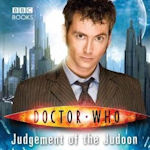Exclusive Interview: Colin Brake

We were recently given the opportunity to speak to Colin Brake, the author of various Doctor Who books including Escape Velocity and Judgement of the Judoon.
During our Q&A, Colin tells us how he got into writing, the most difficult part of writing a Doctor Who story, and what Doctor Who projects he’s got lined up for the future. We’d like to send our thanks to Colin for taking the time out to answer our questions, and also to Penguin Books for arranging the interview.
Q. Have you always been interested in writing?
A. As long as I can remember. I know that I was keen to write from an early age, and I always enjoyed English as a subject. When I was 11 and started at my Grammar School, the first thing I wrote was an all about me piece in which I declared my intent to be a book writer. I think I said I wanted to continue the Famous Five series by Enid Blyton!Q.Were you a fan of Doctor Who when you were growing up?
A. Yes. I’m just a little bit older than the series itself, so my first memories are of Patrick Troughton as the Doctor from around 1968, when I would have been 6 I guess! I’ve been a fan ever since.Q. Was it difficult to convey the Tenth Doctor’s characterisation in The Price of Paradise? Which of his attributes and traits were easiest to show on page?
A. When you have a performer as brilliant as David Tennant to work with, it does make it easy. Of course, you have to adapt what you see on screen onto the page, which means a bit of tinkering, but David’s speech patterns as the Doctor were so clearly established that it was easy to write dialogue for him. Once you’ve got that right, the rest follows. We’re very lucky with Doctor Who that so many of the lead actors were such good actors with clearly defined speech patterns.Q. What would you say is the most difficult part of writing a Doctor Who story?
A. Like any kind of writing, the hardest part is starting. Writers are very good at doing other things. When I used to be freelance, I used to find all sorts of things to do; popping to the supermarket, doing the
washing, reading the newspaper… These days I have a full time job (as a teacher) and write in my spare time, so I have to be more disciplined. I have less time to waste so once all the essential thinking, plotting
and planning is done, I just have to get on with it. That first sentence is still the hardest one though. The trick is to just write anything to get you started – you can always cut it or rewrite it later!Q. In some ways, the Doctor’s adventures in a novel can be even more ambitious than they are on screen. What opportunities and problems does this present for a writer?
A. The opportunities are all about scale and spectacle, although these days CGI means that the TV show can be pretty big scale and spectacular itself, which was never the case with the original series! The problems are about making sure that the story doesn’t stop being a Doctor Who story. It’s easy to get diverted by the characters and settings you’ve created, and you have to keep coming back to the fact that you are writing a Doctor Who story, and the Doctor (and his companions) have to be at its heart.Q. Have you got any Doctor Who projects lined up for the future?
A. I’m currently writing a Big Finish audio play for one of the Doctor Who spin-off range, and after that I really don’t know. Fingers crossed there will me more Doctor Who books to write in the future…
